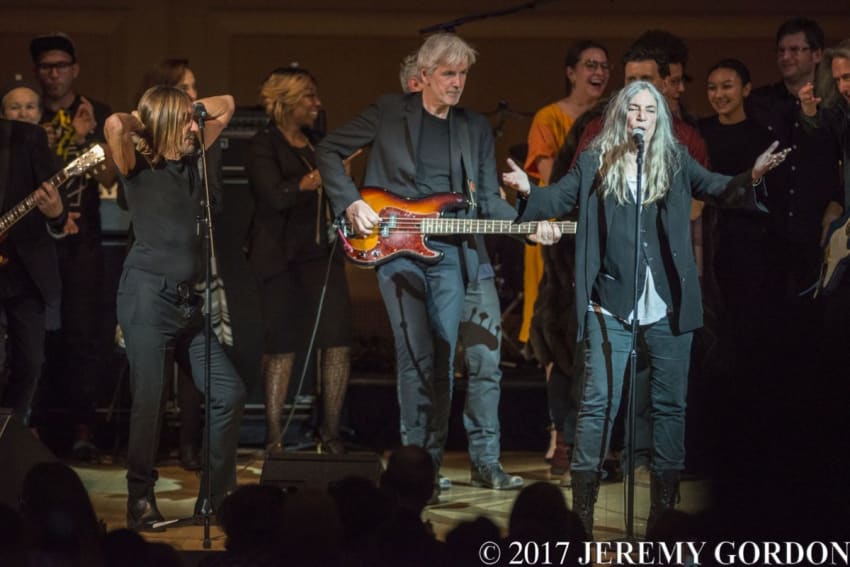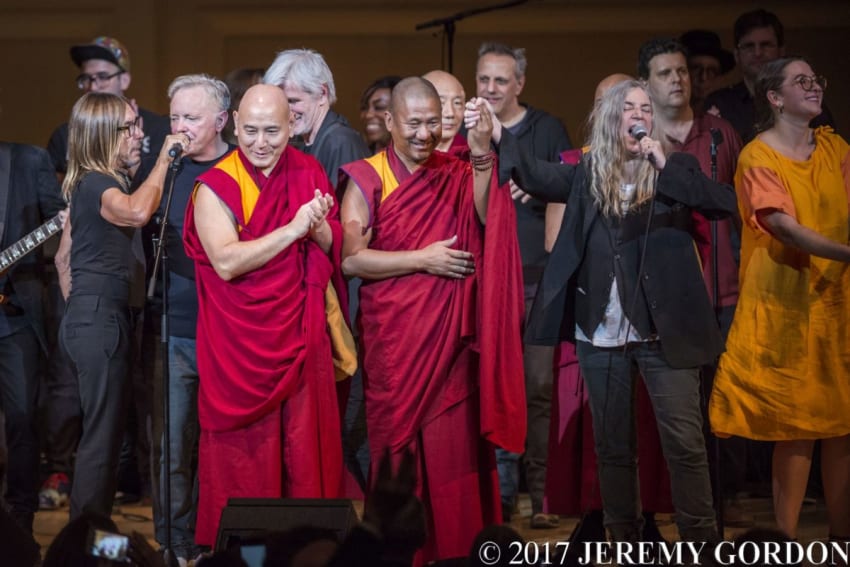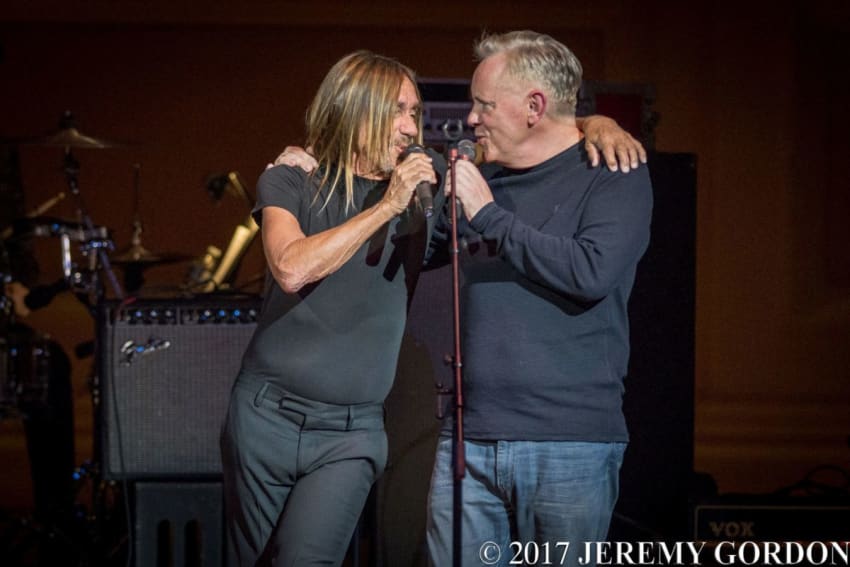Joy And Righteous Anger: The 2017 Tibet House Benefit Concert – Review & Photos
By Roger Weisman Mar 20, 2017 • 10:44 am PDT
Images by: Jeremy Gordon
Words by: Roger Weisman
Tibet House Benefit Concert :: 3.16.17 :: Carnegie Hall :: NYC
On Thursday night the annual Tibet House benefit concert was held at Carnegie Hall in New York City, a tradition since the early-1990s. As was custom, the show was wildly eclectic, featuring a broad array of performers representing varying styles and disciplines, often with unique one-off collaborations in which artists would push their own boundaries and bring their music into unknown territory, sometimes resulting in sublime new combinations, and at other times intriguing diversions.
This year’s concert was notable for a number of reasons. Firstly, the Tibet House US Cultural Center is celebrating the 30th anniversary of its founding. In addition, they were celebrating the 80th birthday of one of its founders, the celebrated American composer, Philip Glass, the artistic director and curator of the evening.
It was also was the first Tibet House benefit concert of the new presidential administration. And yeah, it got political.
How could it not? The existence of Tibet House is an act of rebellion in itself. Its purpose to is to preserve a culture under occupation and oppression. Each one of these concerts is a political act.
But of course this year is different. In previous years, speakers at the concerts would address the calamity of the Tibetan people, but the rest of the evening focusing on music and art that exemplified the values of Tibetan Buddhism: compassion, empathy, and joy. This year, politics pervaded.
Fortunately, this did not poison the atmosphere. The tone of the evening was perfect for the moment. While everyone who took to the stage was forced to recognize the unsettling nature of our current times, cynicism rarely crept into the picture. Each speaker and artist, in one way or another, entreated upon the audience to maintain strength, openness, empathy and kindness, to make positive steps, to be active agents for change and to forgo despair.
The evening began, as it does year after year, with a sextet of monks taking the stage, chanting to welcome in the Tibetan New Year. Tibet House co-founder, Robert Thurman, subsequently explained that we were entering the Year Of The Firebird. In contrast to the Chinese New Year, as opposed to the Year Of The Rooster, the Tibetan firebird is more akin to the phoenix. And just as the phoenix would arise out of the ashes, Thurman declared, “we will arise out of the horrible Year Of The Monkey.”
“The Year Of The Orange Monkey,” he clarified for the four people in the audience who didn’t get it.
In his remarks, he set the tone for the evening: loving political revolution. “Remain happy and remain loving, but resist!”
Birthday boy, Philip Glass then took the stage, dryly confessing that he frowned on the idea of a big, celebratory party, but had a change of heart when hearing how the music was coming together in the previous day’s rehearsal. “This is a real good birthday party.”
Glass then welcomed the interdisciplinary avant-garde artist Laurie Anderson to the stage. Taking up her violin, she began playing slow delicate lines, gradually and tastefully adding electronic manipulations to drop in subtle fluctuations in tone. Her ensuing words encapsulated anger and loss, while musing philosophical on the current state of the union, the end of democracy leading to the beginning of revolution, and the never-ending pendulum in between. “This is not politics. This is existentialism.”
The piece, entitled “Don’t Go Back to Sea,” was both pointedly political (“Don’t go back to sea” / “You don’t look like a president to me”) and painfully personal, mourning the loss of her husband, Lou Reed, who passed away in 2013. She invoked his words from his 1989 song “Dirty Blvd.” in condemnation of the new administration’s immigration policies: “Give me your hungry, your tired, your poor / I’ll piss on ’em / That’s what the Statue of Bigotry says.”
It was the one moment of the evening in which despair was allowed to show its head. “How can we begin again?” she asked.
Philip Glass joined Anderson on piano for the next piece, along with the Scorchio String Quartet, and percussionist Mick Rossi to perform “Etude No. 10.” Rossi, center stage, provided both the musical and visual focal point, with his rhythms propelling the piece while varying in texture and mood, alternately tribal, jazzy, and militant. Against this, Anderson and Glass conversed with their instruments as the strings ebbed and swelled like deep breathing.
Glass’ son Zack (introducing himself as “Wolf”) came out on stage next, paying tribute to his father, playing a wistful, country tinged folk-rock song, “Southern Skies.” It was first of numerous moments in which the theme of family and generations would become prominent throughout the evening.
Alabama Shakes took things up a notch. Playing songs from their last LP, Sound & Color, the band’s intoxicatingly kaleidoscopic take on rhythm and blues was enriched even more with the textures added by Glass on piano and harpist Lavinia Meijer. Augmented by a trio back-up singers, their performance of “Over My Head” proved to be a high point of the evening, a mesmerizing mix of gospel, funk, and baroque-pop, with guitarist and singer Brittany Howard handling this odd mixture with ease, and doing so with style and charisma.
Bringing things back down to the meditative level, Tibetan singer Tenzin Choegyal and Jesse Paris Smith (daughter of Patti and sister of Jackson) performed a piece created around the “Elemental Prayer” from the Tibetan Book Of The Dead. The pair provided a striking contrast with Choegyal’s passionate evocation of the words against Smith’s staid, delicate voice translating.
Ben Harper then took to the stage with his lap steel guitar and played “Paris Sunrise #7,” a languid, spacey solo instrumental that proved to be another highlight of the evening. He then brought his daughter Harris onstage to join him to play “Everything.” Her halting, tentative guitar playing and her unadulterated voice exemplified a simple, pure, unaffected quality. The blend of their voices was beautiful and soothing.
The mini-set of Iggy Pop, backed by members of New Order provided the evening’s moment of levity. On paper, the collaboration would suggest an intense, momentous event, but in reality it was just a bunch of musicians who have been around the block a few times, seen a bunch of things, and were just enjoying themselves onstage. In a striking contrast with the rest of the evening, Iggy and the New Order boys were too busy having fun to make attempts at profundity.
Barrelling through impromptu renditions of “Stray Dog” and “Shades,” the musicians were clearly enjoying themselves onstage, with Iggy and New Order lead singer, Bernard Sumner, playfully dancing together. They finished the Joy Division classic “She’s Lost Control,” thrilling the audience even as the group themselves performed with a delicious lack of reverence.
Indie folk artist Sufjan Stevens added his own low-key protest, performing his unique version of “The Star-Spangled Banner” alongside singer Cat Martino and backed by The Patti Smith Group, introducing it as “the theme song to the current darkness.” After, taking a lighter tone, he played the simple, sweet-natured “Happy Birthday To You,” in honor of Glass.
Finally the musician/poet/national treasure Patti Smith took to the stage. She addressed the audience, relating how her association with the Tibet House came through the poet Allen Ginsberg. “We think of him on these nights, and I want to play a song that he loved.”
She began singing Bob Dylan’s “A Hard Rain’s A-Gonna Fall” solely accompanied by her son Jackson Smith on guitar. With each successive verse, one by one, other members of her band dropped into the arrangement, the song growing from a quiet personal plea, to a rich, stirring prayer, with Patti’s emotion-drenched voice supported by her sympathetic long-time musical compatriots. It was a perfect moment.
She followed this with her 1979 song “Citizen Ship,” another pointed attack on current immigration policy, embellishing the song with new words in an interrogating tone: “Show us your papers! What’s your religion?!” The attack was inevitable, and I believe that everyone in the audience would have been disappointed if she didn’t twist the knife a little bit.
In the end, however, the evening was to be about unity and empathy. She concluded the evening by bringing the entire ensemble onstage for her song “People Have The Power.” The jubilance on the stage demonstrated that righteous anger and compassion can and must coexist. Smith, hand in hand with the monks who began the evening, beseeched the audience to use the energies and powers that they have, to speak out, to vote, to strike, before her final proclamation, “Don’t forget that joy is one of our greatest fucking weapons!”
Amen.






